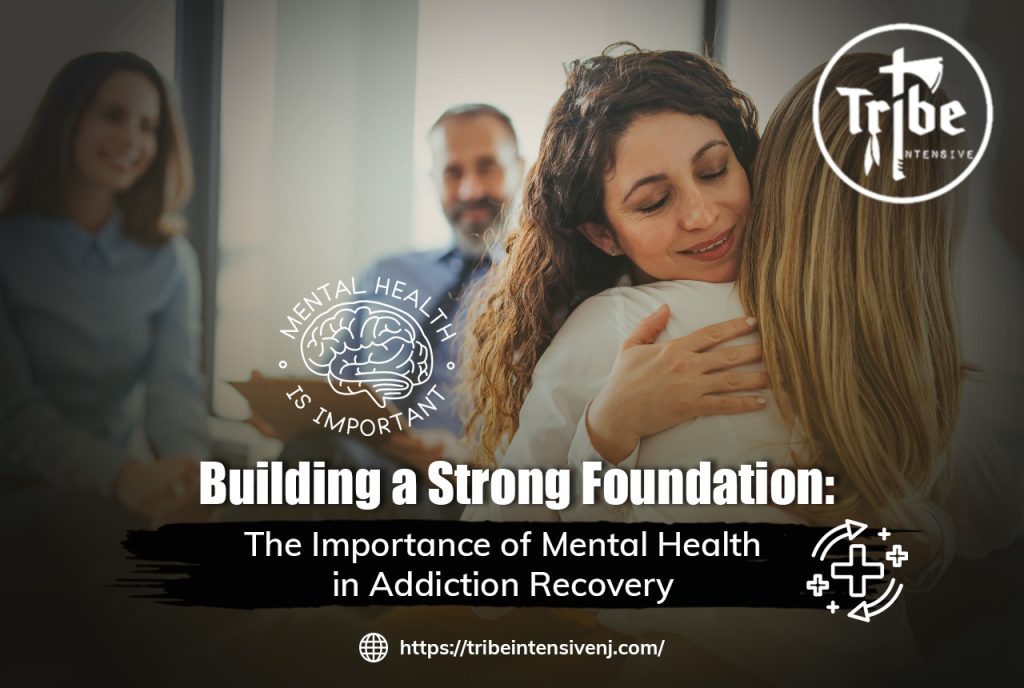Addiction recovery is a multifaceted process that requires a holistic approach to healing. While physical detoxification and rehabilitation are essential aspects of the recovery journey, one of the most overlooked but crucial components is mental health. Mental well-being plays a pivotal role in both the success and sustainability of recovery from substance abuse, and building a strong mental health foundation is key to ensuring long-term sobriety and emotional resilience.
In this blog post, we will explore the importance of mental health in addiction recovery, how mental health and addiction are interconnected, and the steps that individuals and treatment programs can take to foster a healthy mental environment during the recovery process.

The Connection Between Addiction and Mental Health
It is important to recognize that addiction and mental health are closely linked. According to the National Institute on Drug Abuse (NIDA), many individuals who suffer from addiction also have underlying mental health disorders, such as depression, anxiety, or post-traumatic stress disorder (PTSD). This dual diagnosis, also known as co-occurring disorders, can complicate the recovery process if not properly addressed.
Substance abuse is often used as a coping mechanism to deal with the pain, trauma, or emotional distress caused by mental health issues. Over time, this reliance on substances exacerbates both the addiction and the mental health condition, creating a vicious cycle that is difficult to break without proper intervention. For example, an individual with anxiety might use alcohol or drugs to numb their feelings, but the substances only provide temporary relief, often worsening the anxiety in the long term.
Treating addiction without addressing the underlying mental health issues is like trying to fix a broken car without repairing the engine. To achieve lasting recovery, both the addiction and the mental health challenges need to be treated simultaneously. This comprehensive approach helps individuals build the emotional strength needed to resist triggers and manage stress without resorting to substance use.
Mental Health as the Foundation for Recovery
Building a strong foundation of mental health is essential in addiction recovery for several reasons:
1. Improved Coping Skills
One of the primary reasons individuals turn to substances is to cope with stress, trauma, or negative emotions. In recovery, individuals must learn new, healthier coping mechanisms to manage life’s challenges. Building a solid mental health foundation allows individuals to develop these skills.
Therapies such as Cognitive Behavioral Therapy (CBT), Dialectical Behavior Therapy (DBT), and mindfulness practices help individuals identify and challenge negative thought patterns, reframe their thinking, and adopt healthier ways to manage emotions. With a strong mental health foundation, individuals are better equipped to face setbacks, disappointments, and stressors without resorting to substance use.
2. Increased Emotional Resilience
Addiction recovery is often a long and challenging journey filled with highs and lows. Emotional resilience—the ability to recover from setbacks and stay motivated—is crucial in navigating these ups and downs. Mental health care provides the tools to build emotional resilience, which is essential for overcoming obstacles and remaining committed to sobriety.
With proper mental health support, individuals can improve their self-esteem, learn self-compassion, and cultivate a sense of inner strength. These qualities are invaluable when confronting the inevitable difficulties that arise in recovery. Strong mental health helps individuals stay grounded and focused on their goals, even when faced with the temptation to relapse.
3. Addressing Co-Occurring Disorders
As mentioned earlier, many individuals who struggle with addiction also have co-occurring mental health disorders. It is estimated that nearly half of individuals with substance abuse problems also suffer from mental health conditions. When both issues are treated simultaneously, the chances of successful recovery are greatly increased.
A comprehensive treatment program should integrate mental health care into addiction treatment. This can include therapy, medication management, support groups, and holistic healing methods such as yoga or meditation. By addressing both addiction and mental health, individuals are more likely to experience long-term sobriety and emotional stability.
4. Preventing Relapse
Mental health care plays a critical role in relapse prevention. When individuals neglect their mental health in recovery, they are at a higher risk of relapse. Stress, anxiety, depression, and unresolved trauma can trigger cravings and emotional instability, making it harder to stay sober.
By prioritizing mental health in recovery, individuals can recognize the signs of emotional distress early and take proactive steps to manage these feelings. Whether it’s through therapy, peer support, or self-care practices, individuals with strong mental health foundations are better equipped to avoid relapse triggers and remain committed to their recovery goals.
5. Building Healthy Relationships
Addiction often strains relationships with family, friends, and loved ones. In recovery, building healthy, supportive relationships is crucial for maintaining sobriety and emotional well-being. Mental health is integral to developing the emotional intelligence and communication skills necessary to repair and nurture these relationships.
Therapy and support groups can help individuals process their past actions, learn to communicate effectively, and practice empathy. By fostering healthy relationships, individuals in recovery create a network of support that can provide encouragement, understanding, and accountability throughout the recovery process.
Steps to Strengthen Mental Health in Addiction Recovery
While mental health is essential to the recovery process, it is not something that can be achieved overnight. Here are some steps individuals and treatment programs can take to strengthen mental health during addiction recovery:
1. Therapy and Counseling
Individual therapy, group therapy, and family counseling are all essential components of mental health care in addiction recovery. Therapy provides a safe space for individuals to process emotions, develop coping strategies, and work through trauma.
2. Support Groups
Support groups, such as Alcoholics Anonymous (AA) or Narcotics Anonymous (NA), provide individuals with a sense of community and shared experience. These groups can help reduce feelings of isolation and encourage individuals to seek help when needed.
3. Mindfulness and Meditation
Mindfulness practices, such as meditation, yoga, and breathing exercises, can help individuals become more aware of their thoughts and emotions. These practices promote relaxation, reduce stress, and improve emotional regulation, which are essential in recovery.
4. Medication Management
For individuals with co-occurring mental health disorders, medication may be necessary to manage symptoms. Working with a mental health professional to find the right medications can help individuals stabilize their mood and mental state, making it easier to focus on recovery.
5. Self-Care and Healthy Lifestyle
Self-care activities such as exercise, eating nutritious foods, getting enough sleep, and engaging in hobbies are all vital for maintaining mental health. These activities not only improve physical health but also promote positive mental well-being.
Building a strong mental health foundation is essential in the recovery process. Addiction is not only a physical challenge but a mental and emotional one as well. By addressing mental health, individuals in recovery can improve their coping skills, build resilience, address co-occurring disorders, prevent relapse, and create meaningful, supportive relationships.
Recovery is not a linear process, and it requires a comprehensive approach that addresses both the body and the mind. With proper mental health care, individuals can strengthen their emotional resilience, increase their chances of long-term sobriety, and live healthier, more fulfilling lives.
If you or someone you know is struggling with addiction, it’s important to seek help from a program that understands the importance of mental health in the recovery process. With the right support, recovery is possible.

